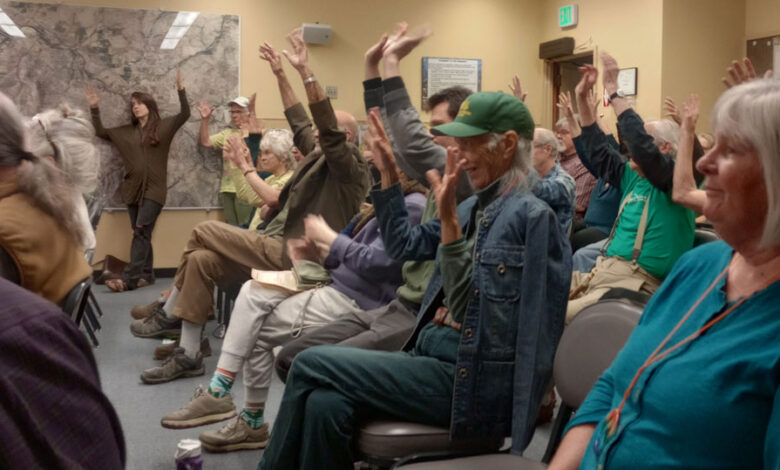Despite public pushback, council approves first reading of telecommunications ordinance – Ashland News

Concerns about 5G technology bring large crowd to comment; decision not final until after second reading
By Morgan Rothborne, Ashland.news
Nearly every seat in the Ashland City Council chamber Tuesday was filled by residents in opposition to the city’s new telecommunication ordinance. Those who spoke in public comment argued the city isn’t doing enough to protect Ashland from what they called the threat of 5G technology.
Nancy Werner, the attorney the city contracted to draft the ordinance, explained the city is limited by the relative power federal law grants telecommunications providers.
City regulations can’t prohibit, or have the effect of prohibiting, the installation of telecommunications facilities, such as small wireless facilities for 5G technology. Cities can’t regulate where towers are installed. They can impose aesthetic limitations, but only if those rules are in writing before an application is received. Cities also have only 60 to 90 days to review and process applications. Attempts to block the installation of facilities would open the city to the threat of litigation, she said.
“These are the kinds of things we’re trying to work around — how can we have a process that maximizes what the city can do in terms of addressing small cell deployment with the understanding that you don’t have the authority to just stop it from coming,” Werner said.
The proposed new ordinance requires providers to obtain a license, rather than the previous franchise agreement. The license would grant authority for installation if the facility meets the city’s rules and the provider has insurance for any potential damages. The previous franchise agreements required negotiations with every provider while the license will create requirements up front.
A permit was already required for the deployment of every individual telecommunication facility, but the new ordinance created two paths for obtaining a permit — an administrative review process or a discretionary review process.
“An administrative review is like, ‘If you check all the right boxes, you’re going to get your permit.’ A discretionary review is, ‘We’re going to look at this, we’re going to weigh how this permit application lines up to our requirements,’” Werner said.
Three types of applications will qualify for the administrative process. Small wireless facilities that comply with all standards, those in public rights of way, and those defined as “eligible facilities requests” under federal law.
All other applications would go through the discretionary review process. Applicants would be required to hold a neighborhood meeting and report to the city on the character of that meeting. The public works director would then have authority to approve, deny, or approve with conditions.
Mayor Tonya Graham asked Werner how the city would know if the provider was accurately reporting public feedback from the meeting and if the city could require staff to be present. Werner agreed this was a valuable check on telecommunications providers, but advised the city to allow for, rather than require, staff presence to avoid a “potential hook for litigation.”
Werner included a separate resolution in the city’s ordinance with additional design standards for historic and residential districts, allowing some control over where facilities will be installed and how they will appear in “sensitive areas.” Housing these additional standards in a resolution balances control with flexibility, she said. While a resolution carries the force of law, it is easier to modify than an ordinance and unforeseen circumstances should be expected, such as an application that needs to be accepted to avoid being sued.
The ordinance contains a provision for the city’s fire chief to require the applicant to hire an independent consultant to assess wildfire risk for the installation at the applicant’s cost, Werner said. The design standards also require a power shut off switch on every facility for maintenance or wildfires.
A number of Ashland residents — many from the group Oregonians for Safer Technology (OST) — offered public comment in vociferous opposition and with accusations.
Tonya Simmons identified herself as an educator and said she has seen the connection between the “rise of technology” and learning disabilities or other mental disorders. Simmons asked the council to consider broader environmental impacts.
“In Australia in the summer of 2019 to 2020, when the first 5G towers went into service, 1,500 rainbow lorikeets rained out of the skies. … This living world is dying from the technology that does not come together with our own frequencies,” she said.
Kelly Marcotulli acknowledged that the city must work within certain federal constraints, but challenged allowing 5G at all.
“All of us wearing green tonight that you’ve seen coming in and out of these chambers, we are all in support of a safe 5G Oregon, which does not exist if you believe that 5G is safe — we do not,” Kelly Marcotulli said.
The majority of the audience wore green.
She stated she was “appalled” that telecommunications attorney Andrew Campanelli was not speaking at the meeting when many of those in attendance had paid for his services.
“Absolutely, Mr. Campanelli should be here. It is a disgrace that he is not. We paid, by the way, $8,500 for him,” Bruno Marcotulli said.
Bruno Marcotulli went on to accuse Councilor Jeff Dahle of “complete fabrications,”and “gaslighting,” in previous communications with Oregonians for Safer Technology regarding the city’s ability to work with Campanelli.
“Citizens of Ashland want the fullest amount of protection that our money has purchased,” Marcotulli said.
At the close of the public comment period, Councilor Dylan Bloom asked Interim City Manager Sabrina Cotta if the meeting was publicly noticed. When she stated it was, Bloom turned to the audience.
“I am so sorry that your attorney is not here. It is a great shame. … He should be here to help represent all of you and I’m sorry he left you hanging,” he said.
The audience erupted in booing and shouting. Graham reached for her gavel as she informed the room she would “have order.” Police Chief Tighe O’Meara reminded the audience that disruptions could warrant tickets for disorderly conduct. Graham called for a nine-minute recess.
Reached by phone Wednesday, Dahle stated OST had asked the city to hire Campanelli and the city declined. Dahle informed the group the city would be willing to review a draft ordinance from Campanelli. OST raised the funds to pay Campanelli’s fee and submitted the draft as part of the public comment period on the city site. The draft was reviewed and some of Campanelli’s suggestions were incorporated into the city’s ordinance, Dahle said.
Reached by email Wednesday, Bloom stated his comment was in reference to the fact that Campanelli could have attended the meeting via zoom and offered public comment, but did not.
Council voted 5 to 1 to approve the first reading of the telecommunications ordinance with Councilor Gina DuQuenne voting in opposition while Councilors Dahle, Bloom, Eric Hansen, Paula Hyatt and Bob Kaplan voted in favor. The ordinance will need to be voted on again at a second reading before it could go into effect. It’s expected to be on the council agenda for its meeting April 2.
In other council business Tuesday, councilors voted five to one to approve a modified version of a contract with Timberline Helicopters to begin removing dead and dying Douglas Fir trees from the city’s watershed. DuQuenne voted in opposition while Councilors Dahle, Bloom, Hyatt and Kaplan voted in favor of approving a contract for a portion of the proposed project area. Council will review the contract again before completing the remaining project area.
Counselors also voted unanimously to formally create a human resources department in the city and to table the creation of a city recorder department until after the May election.
Email Ashland.news reporter Morgan Rothborne at morganr@ashland.news.
March 21: Date of expected second reading of telecommunications ordinance added.
March 28: Eric Hansen added to list of councilors voting in favor of the telecommunications ordinance.



